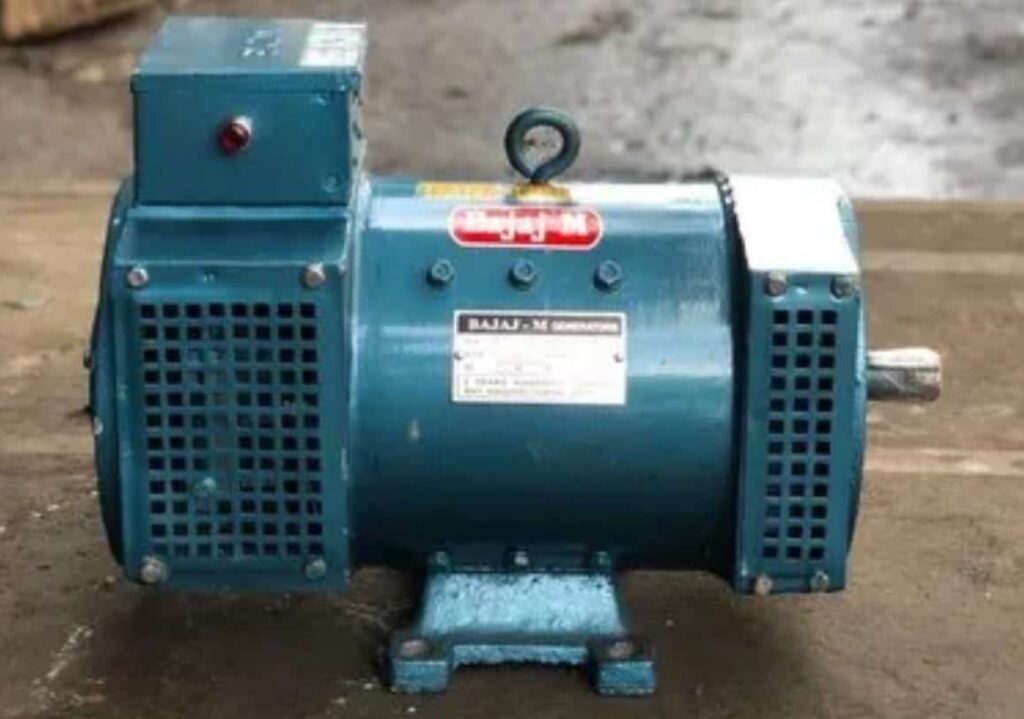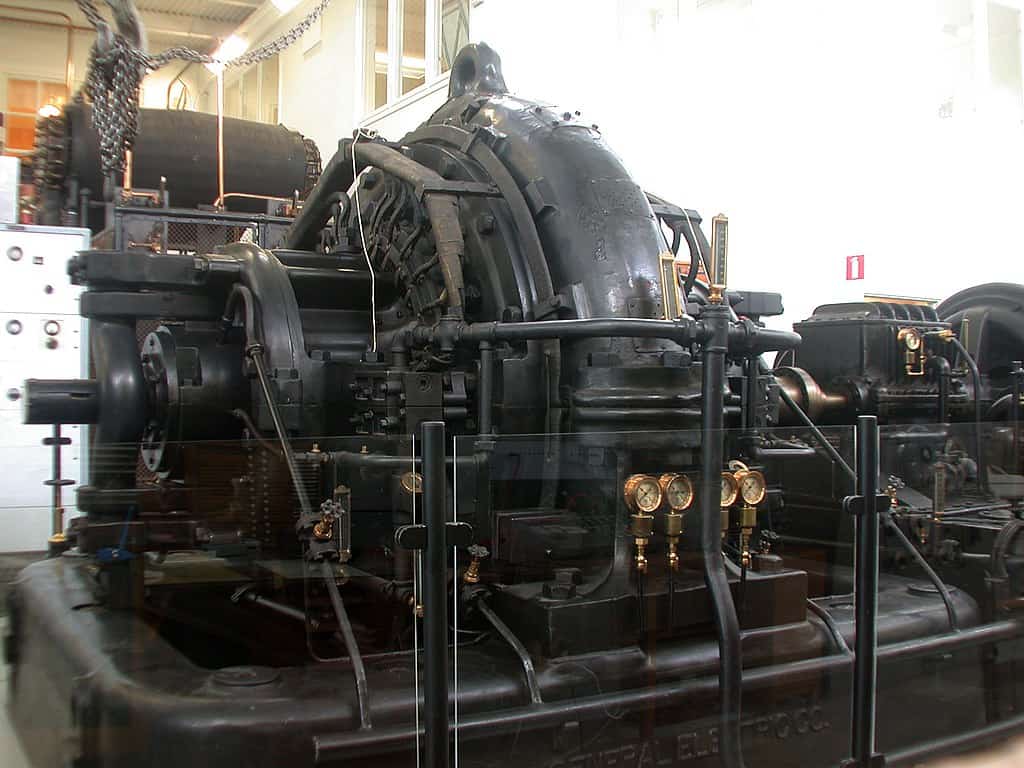Diesel Generator Alternator: A Comprehensive Guide

Diesel generators are essential for providing backup power in a variety of settings, from industrial facilities to residential areas. At the core of a diesel generator lies the alternator, a crucial component responsible for converting mechanical energy from the diesel engine into electrical energy. In this comprehensive guide, we will explore the intricate workings, different types, and important considerations related to diesel generator alternators.
What is Diesel Generator Alternator
An electromechanical device called the diesel generator alternator transforms the mechanical energy produced by the diesel engine into electrical energy. Its primary function is to supply electricity to various loads, ensuring uninterrupted power supply during blackouts or when off-grid power is required.
Diesel Generator Alternator Working Principle
Here are the simple steps that explain the working principle of a diesel generator alternator:
- The diesel engine powers the rotor: The diesel engine drives the rotor of the alternator, causing it to rotate at a specific speed.
- Changing magnetic field generation: As the rotor spins, it creates a changing magnetic field around the field winding. This changing magnetic field is a result of the rotor's rotation.
- Electromagnetic induction: The changing magnetic field induces an alternating current (AC) in the stator windings through electromagnetic induction. The stator windings are the stationary set of three-phase windings.
- Conversion to three-phase AC: The AC generated in the stator windings is a three-phase alternating current. It consists of three separate currents that are out of phase with each other by 120 degrees.
- Rectification into DC: The AC output from the stator windings is rectified into Direct Current (DC) using a set of diodes. These diodes allow the current to flow in only one direction, resulting in a pulsating DC waveform.
- Voltage regulation: To maintain a stable voltage output, an Automatic Voltage Regulator (AVR) is used. The AVR controls the excitation system, which adjusts the magnetic field strength. This regulation ensures that the voltage remains constant within a desired range.
- Excitation system: The excitation system provides the necessary magnetic field to induce voltage in the rotor windings. It can be a rotating permanent magnet generator or a self-excited induction generator.
- Electrical energy generation: The induced voltage in the rotor windings contributes to maintaining the magnetic field required for generating electrical energy. This energy is then available to power various electrical loads connected to the diesel generator.
By following these steps, the mechanical energy from the diesel engine is converted into electrical energy, allowing the diesel generator alternator to provide a reliable source of power for various applications.

Diesel Generator Alternator Parts (Components)
A diesel generator alternator consists of several key parts, each playing a crucial role in its operation. Let's explore these parts in detail:
Stator:
The stator is the stationary component of the alternator and consists of a set of three-phase windings. These windings are typically made of copper or aluminum wire and are evenly distributed around the stator core. The stator windings are responsible for generating the electrical output.
Rotor:
The alternator's revolving component is known as the rotor. It is mounted on the engine shaft and driven by the engine's mechanical energy. The rotor typically contains a field winding, which is excited by the excitation system to create a magnetic field.
Excitation System:
The excitation system supplies the necessary magnetic field to induce voltage in the stator windings. It can take different forms, such as a rotating permanent magnet generator or a self-excited induction generator. The excitation system ensures a stable magnetic field to facilitate the generation of electrical energy.
Diodes:
Diodes play a crucial role in the rectification process of the alternator. They are electronic components that allow the current to flow in only one direction. Diodes are used to convert the alternating current (AC) output from the stator windings into Direct Current (DC), which is necessary for most applications.
Automatic Voltage Regulator (AVR):
The AVR is responsible for regulating the alternator's output voltage. It monitors the electrical load and adjusts the excitation system accordingly to maintain a stable voltage output. The AVR helps prevent voltage fluctuations and ensures a consistent power supply to connected loads.
Bearings:
Bearings are used to support and facilitate the smooth rotation of the rotor shaft. They reduce friction and allow the rotor to spin freely with minimal resistance. Proper lubrication and maintenance of the bearings are essential to ensure smooth operation and prolong the alternator's lifespan.
Slip Rings and Brushes (for brush alternators):
In brush alternators, slip rings and carbon brushes are used to establish electrical contact between the stationary stator windings and the rotating rotor windings. The slip rings provide a surface for the brushes to slide against, enabling the transfer of electrical current from the rotor to the external circuit.
These are the primary parts of a diesel generator alternator, each fulfilling a specific function in the generation and regulation of electrical energy. Understanding the role of these parts is crucial for proper operation, maintenance, and troubleshooting of the alternator.
Types of Diesel Generator Alternators
Brushless Alternators
Brushless alternators are widely used in modern diesel generators due to their numerous advantages. Unlike their brush counterparts, brushless alternators eliminate the need for carbon brushes, resulting in reduced maintenance requirements and enhanced reliability. They employ diodes, an Automatic Voltage Regulator (AVR), and an exciter to ensure stable voltage output. The diodes rectify the AC output from the stator windings into Direct Current (DC), which is then regulated by the AVR to maintain a consistent voltage level. The exciter, usually a rotating permanent magnet generator or a self-excited induction generator, provides the necessary magnetic field to induce voltage in the rotor windings.
Brush Alternators
Brush alternators, while less common in modern diesel generators, still find application in certain specialized scenarios. These alternators employ carbon brushes and slip rings to provide electrical contact between the rotor and stator windings. Brush alternators have advantages such as lower initial cost and better performance under extreme conditions. However, they require regular maintenance to replace worn-out brushes and monitor the condition of the slip rings.
Single-Phase Alternators
Single-phase alternators are used in diesel generator systems where the electrical load primarily consists of single-phase equipment. Common applications include small-scale residential units, rural electrification projects, and portable generators. Single-phase alternators have a simpler design compared to three-phase alternators, with a single set of windings in the stator. However, achieving balanced load distribution can be challenging, and careful load management is required to prevent overloading on one phase.
Three-Phase Alternators
Three-phase alternators are the most commonly used alternators in diesel generator systems. They provide a balanced and efficient distribution of electrical power. Three-phase power is widely utilized in industrial and commercial settings due to its ability to power large motors, machinery, and equipment. Three-phase alternators have three sets of windings spaced 120 degrees apart, enabling them to generate three sinusoidal voltages that are out of phase with each other. This arrangement facilitates smooth power delivery and better load balancing across the three phases.

Key Considerations for Diesel Generator Alternators
Power Rating and Sizing
Selecting the appropriate power rating for a diesel generator alternator is crucial to ensure it can meet the electrical demands of the intended application. Factors to consider include the total power requirements of the connected loads, the starting current of motor-driven equipment, and any potential future expansions or load increases. Proper sizing ensures that the alternator operates within its optimal range, avoiding overload or underutilization.
Voltage and Frequency
Diesel generator alternators are available in various voltage and frequency configurations to suit different regions and applications. It is essential to select an alternator that matches the desired voltage and frequency requirements of the electrical system where it will be integrated. Harmonization with the local power grid, compatibility with equipment, and adherence to electrical standards and regulations are crucial considerations in this aspect.
Efficiency and Fuel Consumption
The efficiency of a diesel generator alternator directly impacts its operating costs and environmental footprint. Higher efficiency alternators convert a greater percentage of the mechanical energy into electrical energy, resulting in reduced fuel consumption and lower emissions. It is advisable to choose alternators with higher efficiency ratings, such as those complying with international standards like ISO 8528.
Maintenance and Serviceability
Regular maintenance and servicing are vital for ensuring the optimal performance and longevity of diesel generator alternators. Consider factors such as accessibility of components, ease of inspection, availability of spare parts, and recommended service intervals when selecting an alternator. Opting for alternators from reputable manufacturers with a reliable service network can simplify maintenance procedures and minimize downtime.
Environmental Conditions
The operating environment plays a significant role in determining the suitable alternator for a given application. Considerations include ambient temperature, humidity, altitude, and the presence of dust, corrosive substances, or vibrations. Diesel generator alternators designed for specific environmental conditions, such as tropicalized alternators or marine-grade alternators, offer enhanced protection and durability in challenging surroundings.
Voltage Regulation and Transient Response
Voltage regulation refers to the ability of the alternator to maintain a stable output voltage within acceptable limits, even under varying load conditions. It is crucial to choose an alternator with a reliable voltage regulation system, such as an Automatic Voltage Regulator (AVR), to prevent voltage fluctuations that could damage sensitive electrical equipment. Additionally, the transient response capability of the alternator is important to ensure a swift recovery and stabilization of the voltage output during sudden load changes or starting of heavy loads.
Noise and Vibration Levels
Noise and vibration can be critical considerations, especially in residential or noise-sensitive areas. Some alternators are designed with noise reduction features, such as soundproof enclosures or mufflers, to minimize the operational noise. Vibration isolation mounts or anti-vibration systems can help reduce the transmission of vibrations, protecting both the alternator and the surrounding structures.
Compliance with Standards and Regulations
Diesel generator alternators should meet relevant industry standards, safety regulations, and emission norms to ensure reliable and compliant operation. Look for alternators that are certified by recognized certification bodies and comply with standards such as ISO, IEC, NEMA, and local regulations specific to the application and geographical location.
Diesel Generator Alternator Price
The price of a diesel generator alternator can vary significantly depending on various factors. These factors include the power rating, brand, quality, features, and market conditions. Additionally, the price may also be influenced by the type of alternator (brushless or brush), the reputation of the manufacturer, and any additional accessories or components included.
Generally, higher power ratings and reputable brands tend to have higher prices. More advanced alternators with features like automatic voltage regulation (AVR) and enhanced efficiency may also be priced higher. Additionally, alternators that meet specific industry standards and regulations may come at a premium.
It is important to note that the price of a diesel generator alternator is often quoted separately from the diesel engine itself. The alternator is typically sold as a separate component or as part of a generator set, which includes the engine and other necessary components.
To get an accurate price for a diesel generator alternator, it is recommended to contact authorized distributors, manufacturers, or dealers. They can provide specific pricing information based on the desired specifications, power rating, and any additional requirements.
It is advisable to consider factors beyond the price alone when selecting a diesel generator alternator. Quality, reliability, after-sales service, and warranty support should also be taken into account to ensure a long-lasting and efficient power solution.
Diesel Generator Alternator Troubleshooting
Troubleshooting a diesel generator alternator involves a systematic approach to identify and resolve any issues that may arise. Here is a step-by-step guide for troubleshooting a diesel generator alternator:
Preliminary Checks:
- Ensure the generator is switched off and disconnected from the power source.
- Inspect the generator for any visible signs of damage, loose connections, or abnormal conditions.
Electrical Connections:
- Verify that all electrical connections, including those to the alternator, are secure and properly tightened.
- Inspect the wiring for any signs of wear, damage, or loose connections.
- Check for any blown fuses or tripped circuit breakers in the electrical system.
Fuel Supply:
- Check the fuel level in the diesel tank and ensure an adequate supply for operation.
- Verify that the fuel lines are free from obstructions and that the fuel filters are clean.
- If necessary, bleed the fuel system to remove any air pockets that may be affecting fuel flow.
Battery System:
- Inspect the battery connections for corrosion or loose terminals.
- Measure the battery voltage to ensure it is within the recommended range.
- If the battery is weak or discharged, recharge or replace it as needed.
Engine Functionality:
- Start the diesel engine and monitor its performance, ensuring it runs smoothly and reaches the appropriate speed.
- Check for any abnormal engine noises, excessive vibrations, or signs of overheating.
- Address any engine-related issues separately, as they may impact the alternator's performance.
Voltage Output:
- Measure the voltage output of the alternator using a multimeter or a voltmeter.
- Compare the measured voltage to the specified operating voltage range for the alternator.
- If the voltage is too low or too high, it may indicate a problem with the alternator or the voltage regulation system.
Automatic Voltage Regulator (AVR):
- Inspect the AVR for any visible damage or loose connections.
- Check the AVR settings and adjust them as per the manufacturer's specifications if necessary.
- Test the AVR's functionality by simulating load changes and observing the alternator's response.
Troubleshooting Tools:
- Utilize diagnostic tools such as an oscilloscope or a clamp meter to measure waveform patterns or current flow, respectively.
- Follow the manufacturer's guidelines for using specific troubleshooting equipment and interpreting the results accurately.
Documentation and Expert Assistance:
- Maintain a detailed log of the troubleshooting process, including the steps taken, measurements, and observations.
- If the issue persists or is beyond your expertise, consult the manufacturer's technical support or contact a qualified service technician for further assistance.
It is important to prioritize safety throughout the troubleshooting process, ensuring that proper precautions are taken and the necessary protective equipment is used. Following these steps systematically can help identify and resolve common issues with a diesel generator alternator, ensuring its optimal performance and reliability.
Conclusion:
The diesel generator alternator is a vital component responsible for converting mechanical energy into electrical energy, ensuring uninterrupted power supply in various applications. By understanding the different types, key considerations, and working principles of diesel generator alternators, one can make informed decisions when selecting, operating, and maintaining these crucial devices. Proper sizing, voltage and frequency compatibility, efficiency, maintenance, environmental suitability, voltage regulation, noise control, and compliance with standards are among the key factors to consider to ensure optimal performance and longevity of diesel generator alternators.


